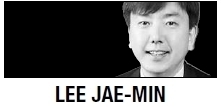
We all know how devastating it is to lose a cellphone or tablet PC, as our daily life is entirely disrupted.
With so much personal information digitized and stored in one single device, the handheld gadget means the entire world for the owner. So, from the perspective of users, nothing would be more sensitive to their privacy than the information contained in this device.
On the contrary, for the law enforcement agencies a cell phone is an information bonanza. Make-or-break materials are stored on the device. Naturally, nothing provides sharper confrontation between national security and privacy than digital devices and cloud technologies. The digitalization cuts both ways.
As one of the most wired countries in the world, this issue is not new to Korea either. For almost two years now, law enforcement agencies and KakaoTalk, a South Korean messaging app, have been wrangling over the agencies’ access to some of the tech company’s messaging data. Knowing that almost 90 percent of South Koreans use the app for daily communication, the agencies have come to appreciate the value of digital information to be mined. In the company’s eyes, however, such cooperation runs the risk of compromising consumers’ privacy and causing a major dent to its business image.
When the FBI retrieved an iPhone used by a terrorist in San Bernardino last December, the agency knew that the smartphone would yield critical information about the events leading to the attack. But the device was encrypted and protected by a password and someone needed to break the code to get to the information inside.
The problem was, 10 incorrect password entries would cause the phone to destroy all the information stored on it. A strong safety feature indeed.
In order to retrieve the information safely, the agency asked Apple to decrypt the iPhone, but the company refused to cooperate, citing the risk of such technologies leading to the invasion of privacy of its consumers. Apple’s continued rejection led to a seminal legal battle over national security versus privacy in the digital age. The legal confrontation has just ended, for better or worse, as the FBI succeeded in breaking the code with the help of hired experts.
These recent examples tell us that the cat-and-mouse games between law enforcement agencies and digital companies will continue, as new technologies will immediately emerge to deal with new vulnerabilities. Companies will continue to develop and apply stronger protection systems for the information of their consumers. With that, the demand from law enforcement agencies for help and cooperation to break down security walls will equally escalate. So this issue stands to intensify over time.
Yet, reliable guidelines are yet to come that balance the state’s interest for national security and individuals’ interest for privacy in the new landscape of the digital age.
What applies now in this field is simply the rules developed from the days of papers and documents collected and stored by corporations, or the days of getting cooperation from phone companies for wiretapping. These conventional rules do not necessarily fit with cyber networks and devices connecting people participating in the networks. Rapid advances in technology are raising new issues in this field as well.
When confronted with this issue, people tend to have a mixed feeling. On the one hand, they release a sigh of relief because the key information has been retrieved to preserve national security. On the other, they raise their eyebrows as their messages and conversations deep inside the smartphones can be broken into and retrieved by outsiders.
We are playing both sides of this fence. Notably, to deal with this new dilemma some countries have initiated a constructive discussion between law enforcement agencies and tech companies in order to explore a new legislation. This is a new development that we need to pay attention to.
By Lee Jae-min
Lee Jae-min is a professor of law at Seoul National University. -- Ed.



![[AtoZ into Korean mind] Humor in Korea: Navigating the line between what's funny and not](http://res.heraldm.com/phpwas/restmb_idxmake.php?idx=644&simg=/content/image/2024/04/22/20240422050642_0.jpg&u=)
![[Exclusive] Korean military set to ban iPhones over 'security' concerns](http://res.heraldm.com/phpwas/restmb_idxmake.php?idx=644&simg=/content/image/2024/04/23/20240423050599_0.jpg&u=20240423183955)


![[Herald Interview] Why Toss invited hackers to penetrate its system](http://res.heraldm.com/phpwas/restmb_idxmake.php?idx=644&simg=/content/image/2024/04/22/20240422050569_0.jpg&u=20240422150649)
![[Graphic News] 77% of young Koreans still financially dependent](http://res.heraldm.com/phpwas/restmb_idxmake.php?idx=644&simg=/content/image/2024/04/22/20240422050762_0.gif&u=)






![[Exclusive] Korean military to ban iPhones over security issues](http://res.heraldm.com/phpwas/restmb_idxmake.php?idx=652&simg=/content/image/2024/04/23/20240423050599_0.jpg&u=20240423183955)



![[Today’s K-pop] Ateez confirms US tour details](http://res.heraldm.com/phpwas/restmb_idxmake.php?idx=642&simg=/content/image/2024/04/23/20240423050700_0.jpg&u=)